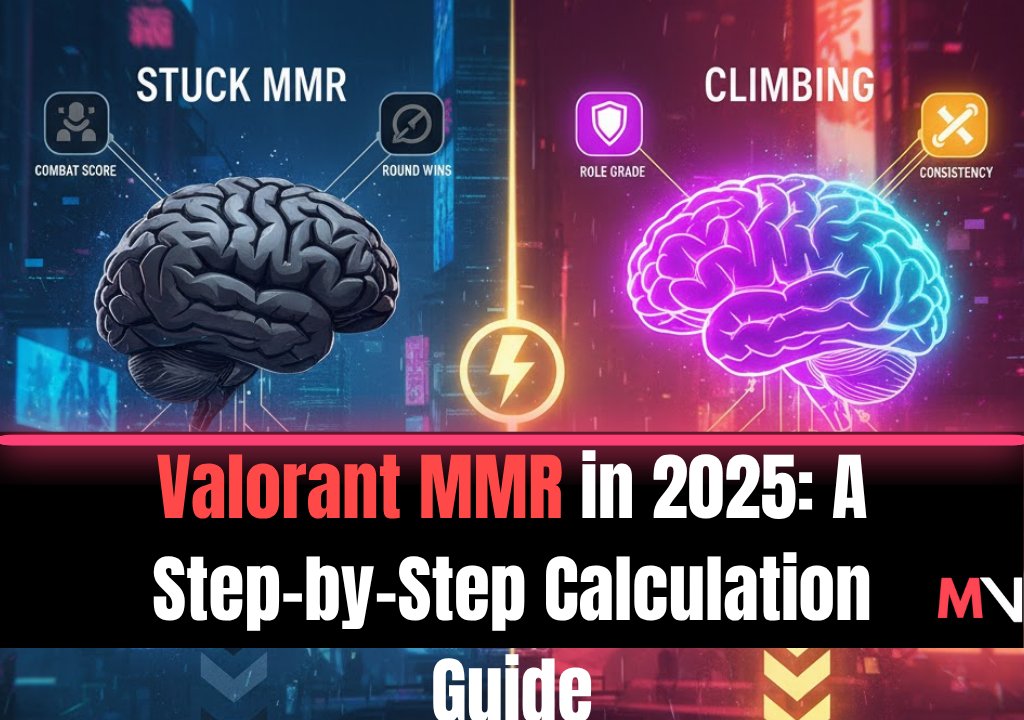How to Fix the Stuck MMR Syndrome in Valorant (2025 Guide)
One of the most annoying things about Valorant is getting stuck at the same rank for weeks or even months. You win some games and lose others, but your MMR (Matchmaking Rating) doesn't seem to change. Players often call this "Stuck MMR Syndrome," and it can seem like Riot's system is working against you. But there are logical reasons for it, and there are ways to get out of it.
What Is Stuck MMR Syndrome?
When your hidden MMR is too close to your visible rank, you have Stuck MMR Syndrome. The system thinks you're doing exactly what your tier says you should be doing—you're not doing too well or too poorly to move up.
That's why you might only get +15 RR after winning, but you lose -25 RR after losing. Your MMR is locked in based on how well you play, how many rounds you win, and how good your team is.
⚙️ Reasons for Stagnation
1. Quality of Wins vs. Quantity of Wins
It's not enough to just win; how you win is important too. The system sees narrow wins (13–11, 14–12) as balanced, so they don't change your MMR very much. Winning by a lot (13–3, 13–5) shows that you are better and gives you more points.
2. Performance That Isn't Consistent
You could be the best player in one game and the worst in the next. Riot's algorithm finds volatility, which lowers MMR confidence. MMR growth is driven by consistency, not occasional brilliance.
3. Queuing Times and Differences in Matchmaking
If you play during off-peak times, you are more likely to get mixed MMR lobbies. If your teammates or opponents have very different hidden skills, your performance data becomes "noisy," which makes ratings less accurate.
4. Mental Tilt and Too Much Waiting
When you're tilted and losing, your MMR can drop quickly. A lot of players get stuck in a cycle of "one more game." When you're tired or angry, even small mistakes seem worse statistically.
5. Meta and Role Misalignment
Every patch makes small changes to the meta. Your chances of winning go down if you keep using old agents, strategies, or roles that aren't doing well in the meta, even if your mechanics are good.
🧠 How to Break the Cycle
1. Focus on Round Differential
Don't just try to win more; try to win cleaner. Don't let your ego get in the way when you're in charge. Every big win raises your MMR baseline faster than a close win.
2. Improve One Main Role or Agent
To be good at climbing, you need to master it, not try a lot of different things. Focusing on one main agent makes sure that the impact is the same on all maps, which helps keep performance stable over time.
3. Control the Number of Matches
Limit the number of ranked games you play each day. Play 3 to 5 focused games, then stop, especially if you lose twice. Stamina has an effect on game sense, which in turn has an effect on MMR.
4. Play at Times That Are Good for You
Wait in line during busy times (like the evening in your area) when there are the most people looking for matches. This makes sure that matches are fairer and performance reviews are more stable.
5. Keeping Track of Data and Doing a Self-Audit
You can use replay tools and third-party trackers to find patterns in your win rate, first-blood ratio, and how useful your items are. You might not know it, but you might be doing worse on some maps or roles.
6. Change Your Mindset: Stop Trying to Get a High Rank
When you play relaxed but focused, MMR stays the same. When you focus too much on your rank, you get stressed and lose sight of other things. Not just RR numbers, but also improvement metrics like impact per round, trades, and post-plant survival.
🔓 Last Thoughts
Stuck MMR Syndrome isn't the end of the road; it's a stop along the way. Before you can move up, the system will test your consistency. Your MMR unlocks naturally when you show that you are better than others over time, and the climb gets faster.
💡 Find Out What Your MMR Is Right Now
Do you want to know if you're really getting better behind the scenes? You can keep track of your hidden MMR, performance trends, and win-based trajectory by going to https://mmrvalorant.com/
. Don't guess anymore; start analyzing — the first step to getting out of a rut is to figure out why you're stuck.
Tags

Author




